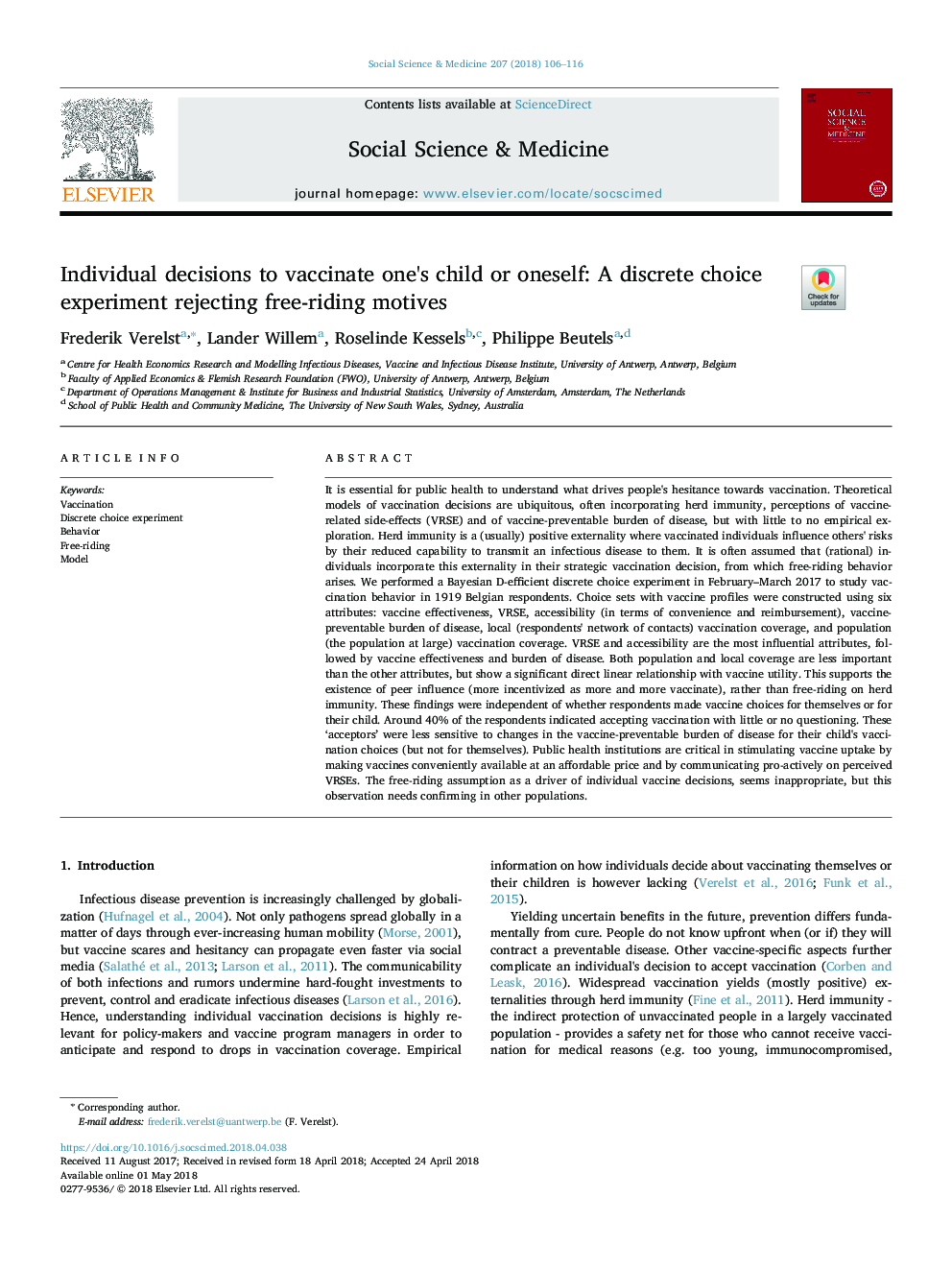| کد مقاله | کد نشریه | سال انتشار | مقاله انگلیسی | نسخه تمام متن |
|---|---|---|---|---|
| 7327795 | 1475962 | 2018 | 11 صفحه PDF | دانلود رایگان |
عنوان انگلیسی مقاله ISI
Individual decisions to vaccinate one's child or oneself: A discrete choice experiment rejecting free-riding motives
ترجمه فارسی عنوان
تصمیم گیری های فردی برای واکسیناسیون فرزند یا خود فرد: یک آزمایش گزینش گسسته، رد انگیزه های آزاد است
دانلود مقاله + سفارش ترجمه
دانلود مقاله ISI انگلیسی
رایگان برای ایرانیان
کلمات کلیدی
واکسیناسیون، آزمایش انتخابی گسسته، رفتار - اخلاق، سواری مجانی، مدل،
موضوعات مرتبط
علوم پزشکی و سلامت
پزشکی و دندانپزشکی
سیاست های بهداشت و سلامت عمومی
چکیده انگلیسی
It is essential for public health to understand what drives people's hesitance towards vaccination. Theoretical models of vaccination decisions are ubiquitous, often incorporating herd immunity, perceptions of vaccine-related side-effects (VRSE) and of vaccine-preventable burden of disease, but with little to no empirical exploration. Herd immunity is a (usually) positive externality where vaccinated individuals influence others' risks by their reduced capability to transmit an infectious disease to them. It is often assumed that (rational) individuals incorporate this externality in their strategic vaccination decision, from which free-riding behavior arises. We performed a Bayesian D-efficient discrete choice experiment in February-March 2017 to study vaccination behavior in 1919 Belgian respondents. Choice sets with vaccine profiles were constructed using six attributes: vaccine effectiveness, VRSE, accessibility (in terms of convenience and reimbursement), vaccine-preventable burden of disease, local (respondents' network of contacts) vaccination coverage, and population (the population at large) vaccination coverage. VRSE and accessibility are the most influential attributes, followed by vaccine effectiveness and burden of disease. Both population and local coverage are less important than the other attributes, but show a significant direct linear relationship with vaccine utility. This supports the existence of peer influence (more incentivized as more and more vaccinate), rather than free-riding on herd immunity. These findings were independent of whether respondents made vaccine choices for themselves or for their child. Around 40% of the respondents indicated accepting vaccination with little or no questioning. These 'acceptors' were less sensitive to changes in the vaccine-preventable burden of disease for their child's vaccination choices (but not for themselves). Public health institutions are critical in stimulating vaccine uptake by making vaccines conveniently available at an affordable price and by communicating pro-actively on perceived VRSEs. The free-riding assumption as a driver of individual vaccine decisions, seems inappropriate, but this observation needs confirming in other populations.
ناشر
Database: Elsevier - ScienceDirect (ساینس دایرکت)
Journal: Social Science & Medicine - Volume 207, June 2018, Pages 106-116
Journal: Social Science & Medicine - Volume 207, June 2018, Pages 106-116
نویسندگان
Frederik Verelst, Lander Willem, Roselinde Kessels, Philippe Beutels,
